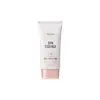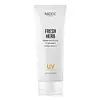What's inside
What's inside
 Key Ingredients
Key Ingredients

 Benefits
Benefits

 Concerns
Concerns

 Ingredients Side-by-side
Ingredients Side-by-side

Water
Skin ConditioningDibutyl Adipate
EmollientPropanediol
SolventDiethylamino Hydroxybenzoyl Hexyl Benzoate
UV FilterPolymethylsilsesquioxane
Ethylhexyl Triazone
UV AbsorberNiacinamide
SmoothingMethylene Bis-Benzotriazolyl Tetramethylbutylphenol
UV FilterCoco-Caprylate/Caprate
EmollientCaprylyl Methicone
Skin ConditioningDiethylhexyl Butamido Triazone
UV AbsorberGlycerin
HumectantButylene Glycol
Humectant1,2-Hexanediol
Skin ConditioningNymphaea Alba Flower Extract
Skin ConditioningCalendula Officinalis Flower Extract
MaskingOenothera Biennis Flower Extract
AstringentUlmus Davidiana Root Extract
Skin ConditioningPinus Palustris Leaf Extract
TonicPueraria Lobata Root Extract
HumectantCitrus Aurantium Dulcis Peel Oil
MaskingCymbopogon Martini Oil
MaskingRosa Damascena Flower Oil
MaskingPentylene Glycol
Skin ConditioningBehenyl Alcohol
EmollientPoly C10-30 Alkyl Acrylate
Emulsion StabilisingPolyglyceryl-3 Methylglucose Distearate
EmulsifyingDecyl Glucoside
CleansingTromethamine
BufferingCarbomer
Emulsion StabilisingAcrylates/C10-30 Alkyl Acrylate Crosspolymer
Emulsion StabilisingSodium Stearoyl Glutamate
CleansingPolyacrylate Crosspolymer-6
Emulsion StabilisingEthylhexylglycerin
Skin ConditioningAdenosine
Skin ConditioningXanthan Gum
EmulsifyingT-Butyl Alcohol
PerfumingTocopherol
AntioxidantLimonene
PerfumingGeraniol
PerfumingWater, Dibutyl Adipate, Propanediol, Diethylamino Hydroxybenzoyl Hexyl Benzoate, Polymethylsilsesquioxane, Ethylhexyl Triazone, Niacinamide, Methylene Bis-Benzotriazolyl Tetramethylbutylphenol, Coco-Caprylate/Caprate, Caprylyl Methicone, Diethylhexyl Butamido Triazone, Glycerin, Butylene Glycol, 1,2-Hexanediol, Nymphaea Alba Flower Extract, Calendula Officinalis Flower Extract, Oenothera Biennis Flower Extract, Ulmus Davidiana Root Extract, Pinus Palustris Leaf Extract, Pueraria Lobata Root Extract, Citrus Aurantium Dulcis Peel Oil, Cymbopogon Martini Oil, Rosa Damascena Flower Oil, Pentylene Glycol, Behenyl Alcohol, Poly C10-30 Alkyl Acrylate, Polyglyceryl-3 Methylglucose Distearate, Decyl Glucoside, Tromethamine, Carbomer, Acrylates/C10-30 Alkyl Acrylate Crosspolymer, Sodium Stearoyl Glutamate, Polyacrylate Crosspolymer-6, Ethylhexylglycerin, Adenosine, Xanthan Gum, T-Butyl Alcohol, Tocopherol, Limonene, Geraniol
Water
Skin ConditioningHomosalate
Skin ConditioningButylene Glycol
HumectantDipropylene Glycol
HumectantEthylhexyl Salicylate
UV AbsorberMethyl Methacrylate Crosspolymer
Butyl Methoxydibenzoylmethane
UV AbsorberPhenylbenzimidazole Sulfonic Acid
UV AbsorberC12-15 Alkyl Benzoate
AntimicrobialCetearyl Alcohol
EmollientGlyceryl Stearate
EmollientCetearyl Olivate
Octocrylene
UV AbsorberCalendula Officinalis Flower Water
MaskingCalendula Officinalis Extract
Skin ConditioningCastanea Crenata Shell Extract
Skin ConditioningLavandula Angustifolia Flower Extract
CleansingCamellia Sinensis Leaf Extract
AntimicrobialVaccinium Macrocarpon Fruit Extract
AstringentCitrus Aurantium Bergamia Fruit Oil
MaskingPelargonium Graveolens Flower Oil
MaskingLavandula Hybrida Oil
EmollientCananga Odorata Flower Oil
MaskingSorbitan Olivate
EmulsifyingPolysorbate 60
EmulsifyingDimethicone
EmollientPolyacrylate-13
Sodium Hydroxide
BufferingPEG-100 Stearate
Sorbitan Stearate
EmulsifyingPolyisobutene
BHT
AntioxidantPolysorbate 20
EmulsifyingSorbitan Isostearate
EmulsifyingDisodium EDTA
Caprylyl Glycol
EmollientEthylhexylglycerin
Skin Conditioning1,2-Hexanediol
Skin ConditioningLimonene
PerfumingLinalool
PerfumingCitronellol
PerfumingGeraniol
PerfumingBenzyl Benzoate
AntimicrobialWater, Homosalate, Butylene Glycol, Dipropylene Glycol, Ethylhexyl Salicylate, Methyl Methacrylate Crosspolymer, Butyl Methoxydibenzoylmethane, Phenylbenzimidazole Sulfonic Acid, C12-15 Alkyl Benzoate, Cetearyl Alcohol, Glyceryl Stearate, Cetearyl Olivate, Octocrylene, Calendula Officinalis Flower Water, Calendula Officinalis Extract, Castanea Crenata Shell Extract, Lavandula Angustifolia Flower Extract, Camellia Sinensis Leaf Extract, Vaccinium Macrocarpon Fruit Extract, Citrus Aurantium Bergamia Fruit Oil, Pelargonium Graveolens Flower Oil, Lavandula Hybrida Oil, Cananga Odorata Flower Oil, Sorbitan Olivate, Polysorbate 60, Dimethicone, Polyacrylate-13, Sodium Hydroxide, PEG-100 Stearate, Sorbitan Stearate, Polyisobutene, BHT, Polysorbate 20, Sorbitan Isostearate, Disodium EDTA, Caprylyl Glycol, Ethylhexylglycerin, 1,2-Hexanediol, Limonene, Linalool, Citronellol, Geraniol, Benzyl Benzoate
 Reviews
Reviews

Ingredients Explained
These ingredients are found in both products.
Ingredients higher up in an ingredient list are typically present in a larger amount.
1,2-Hexanediol is a synthetic liquid and another multi-functional powerhouse.
It is a:
- Humectant, drawing moisture into the skin
- Emollient, helping to soften skin
- Solvent, dispersing and stabilizing formulas
- Preservative booster, enhancing the antimicrobial activity of other preservatives
Butylene Glycol (or BG) is used within cosmetic products for a few different reasons:
Overall, Butylene Glycol is a safe and well-rounded ingredient that works well with other ingredients.
Though this ingredient works well with most skin types, some people with sensitive skin may experience a reaction such as allergic rashes, closed comedones, or itchiness.
Learn more about Butylene GlycolEthylhexylglycerin (we can't pronounce this either) is commonly used as a preservative and skin softener. It is derived from glyceryl.
You might see Ethylhexylglycerin often paired with other preservatives such as phenoxyethanol. Ethylhexylglycerin has been found to increase the effectiveness of these other preservatives.
Geraniol is used to add fragrance/parfum to a product. It is the main component of citronellol. It is a monoterpenoid and an alcohol.
Monoterpenes are naturally found in many parts of different plants.
Geraniol can be found in many essential oils including Rose Oil and Citronella Oil. The scent of Geraniol is often described as "rose-like". Many foods also contain Geraniol for fruit flavoring.
Geraniol can irritate the skin when exposed to air. However, irritation depends on the ability of geraniol to penetrate into the skin. In general, geraniol is not able to penetrate skin easily.
Geraniol is colorless and has low water-solubility. However, it is soluble in common organic solvents.
Like citronellol, it is a natural insect repellent.
2,6-Octadien-1-ol, 3,7-dimethyl-, (2E)-
Learn more about GeraniolLimonene is a fragrance that adds scent and taste to a formulation.
It's found in the peel oil of citrus fruits and other plants such as lavender and eucalyptus. The scent of limonene is generally described as "sweet citrus".
Limonene acts as an antioxidant, meaning it helps neutralize free radicals.
When exposed to air, oxidized limonene may sensitize the skin. Because of this, limonene is often avoided by people with sensitive skin.
The term 'fragrance' is not regulated in many countries. In many cases, it is up to the brand to define this term. For instance, many brands choose to label themselves as "fragrance-free" because they are not using synthetic fragrances. However, their products may still contain ingredients such as essential oils that are considered a fragrance.
Learn more about LimoneneWater. It's the most common cosmetic ingredient of all. You'll usually see it at the top of ingredient lists, meaning that it makes up the largest part of the product.
So why is it so popular? Water most often acts as a solvent - this means that it helps dissolve other ingredients into the formulation.
You'll also recognize water as that liquid we all need to stay alive. If you see this, drink a glass of water. Stay hydrated!
Learn more about Water